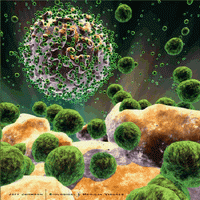Researches Say There Is Still Long way to Go before HIV Vaccine Becomes Universally Available
As an HIV vaccine success in Thailand stirs interest and hope. AIDS researcher at the University of Miami Medical School says she is preparing to start human trials for a new vaccine that would fight the deadly virus.

While the Thai experiment is the first to prevent infection by the HIV virus that creates AIDS, Dr. Margaret Fischl of UM is working on a vaccine that would be given to patients already infected with HIV to help boost their immune systems to fight off the disease. Both vaccines are years away.
If successful, the Fischl vaccine could replace the two- and three-drug ``cocktails'' of antiretroviral drugs now used to improve and prolong the lives of people with HIV. That approach is expensive and also produces numerous side effects, MiamiHerald.com reports.
It was also reported, there is still a very long way to go before reaching the goal of producing a vaccine that reliably shields people from HIV.
Some researchers questioned whether the apparent 31 percent reduction in infections was a statistical anomaly resulting from the small number of HIV cases observed in the trial.
If the protection was real, how did the vaccine do it? Researchers have never observed antibodies or other blood molecules that could block HIV infection.
Experts predicted it will take two to three years to identify the biological molecules linked to the protection, and another five to 10 to produce a vaccine to test in people.
Despite the many questions, researchers are ecstatic. After 26 years, they have finally made progress on demonstrating the feasibility of an HIV vaccine, said Dr. Anthony Fauci, director of the National Institute of Allergy and Infectious Diseases, which largely funded the $120 million study. But "is it a vaccine that is ready for prime time? No," San Jose Mercury News reports.
News agencies also report, according to the Thai Ministry of Health and the study's other backers, the vaccine regimen was safe and 31 percent effective in preventing HIV infection compared with a placebo. Researchers described that result as significant and promising for the future, but not enough to make such a product available to the public soon.
"We are still many years away from a vaccine that will be used universally," said Dr. Jay Levy, professor of medicine at the AIDS Research Institute at UC San Francisco and one of the discoverers of HIV. "But this is encouraging because it says maybe we can derive things from this study and not have to go into something totally different."
Half of the more than 16,000 study participants were given six doses of the vaccines in 2006, and half received placebos. All received condoms, counseling, regular HIV testing and treatment for any sexually transmitted diseases. Of the 8,197 volunteers who were given the vaccine, new infections occurred in 51 people. New infections occurred in 74 of 8,198 participants who received the placebo shot, San Francisco Chronicle reports.
Subscribe to Pravda.Ru Telegram channel, Facebook, RSS!





